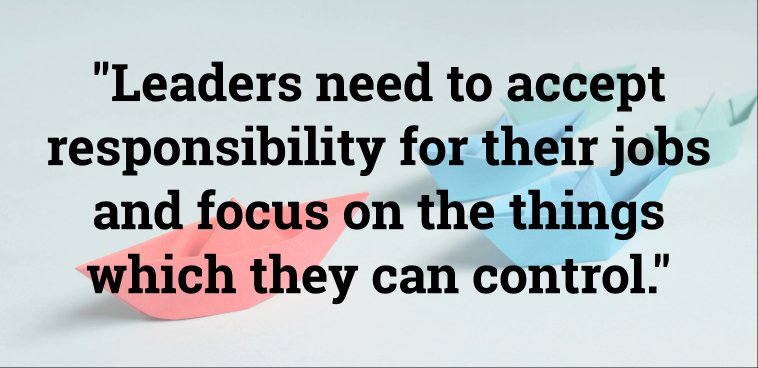We all make excuses.
Whether they cover up for why we were late (“There was no parking”), provide a reason as to why we didn’t do that errand that our spouse requested (“It didn’t get into my to-do list”), seek to justify why we broke our diet (“There we SO many sweets on the table”), or attempt to explain why we didn’t get the business deal (“My competition swept in and undercut me”), we use excuses throughout our day to justify our errors and explain away our failings.
The reason that we do this, according to psychologists, is to protect ourselves against anxiety and shame. It is simply easier to blame external factors than ourselves for our lack of achievement or for letting ourselves or others down. The problem is, the more that we make excuses, the likelier we are to build barriers that will impede our chances of attaining meaningful goals in the future.
While excuse-making is common to everyone, it can be particularly problematic for leaders. Leaders are responsible for their own work and those whom they lead. When leaders excuse away failures, they lower the standard at which they operate, which will inevitably reduce their productivity and impact. Worse, such behavior helps to create a culture of excuse-making that quickly trickles down the pipeline.
In no time, people throughout the organization feel vindicated in justifying their miscues or lack of production. And if the boss makes his/her own excuses all the time, who is going to call them on it?
According to the World Economic Forum, executive excuse-making comes in many forms and includes personal excuses (such as being under excessive pressure, not being paid enough to deal with real problems, and being poorly trained) as well as perceived external factors (like an inherited political climate or how others respond to their leadership).
Obviously, for leaders to succeed they can’t be in the business of making excuses. They have to set high (but achievable) standards and then make sure to hold themselves and those around them accountable. The following strategies can help leaders create a more accountable and higher-achieving work environment.
Own the problem
Before leaders can do anything to change their excuse-making behavior, they have to be willing to own the problem. They must take an honest look in the mirror and recognize that they must own their behaviors as well as their reactions. The following anecdote captures this idea well. (While the context focuses on employee excuse-making, its relevance is equally applicable for the guy in charge.)
Once, at the beginning of the workday, all of the employees arrived at the office to start on their duties. When they arrived, they saw a big sign on the door that said, “Yesterday the person who has been hindering your growth in this company passed away. The funeral will begin shortly outside.”
Nobody knew who the sign was referring to, but they all went anyway, saddened by the news. As they approached the coffin to see who this person was that was inhibiting their progress, they were shocked by what they saw. Instead of viewing a person, they were greeted with a mirror. Everyone who looked inside saw himself or herself.
A sign next to the mirror read as follows: “There is only one person who is capable to set limits to your growth: YOU. You are the only person who can help yourself. Your life does not change when others change or when circumstances change. Your life changes when you change, when you go beyond your limiting beliefs, when you realize that you are the only one responsible for your life.”
Take responsibility
At its core, excuse-making comes from a person’s inability or unwillingness to take responsibility for their behaviors. Leaders need to accept responsibility for their jobs and focus on the things which they can control. Train yourself to always accept responsibility for the things you do and the things you fail to do. Even in cases where events occur that are outside of your control, you should avoid making excuses and identify the things which you can change to get a better result next time. Responsibility and control = power.
Focus on what matters
Often we waste time on things that don’t matter and then find excuses to justify our decisions. Time management and goal setting techniques and tools can help leaders focus better and get more done.
Set high standards
Ironically, though high standards are harder to reach than lower ones, folks who set high standards tend to work harder to achieve them. Moreover, even when they come up short, they are more willing to analyze their “failures” objectively so that they can learn from them and not have a repeat performance the next time.
Strong leaders know that making excuses only delays the end goal. If we take responsibility for inaction or mistakes, we’re able to correct them and get back on track towards the goal.
Naphtali Hoff, PsyD, (@impactfulcoach) became an executive coach and organizational consultant following a career as an educator and school administrator. Check out his new leadership book, “Becoming the New Boss.” Read his blog.
If you enjoyed this article, join SmartBrief’s e-mail list for our daily newsletter on being a better, smarter leader.
